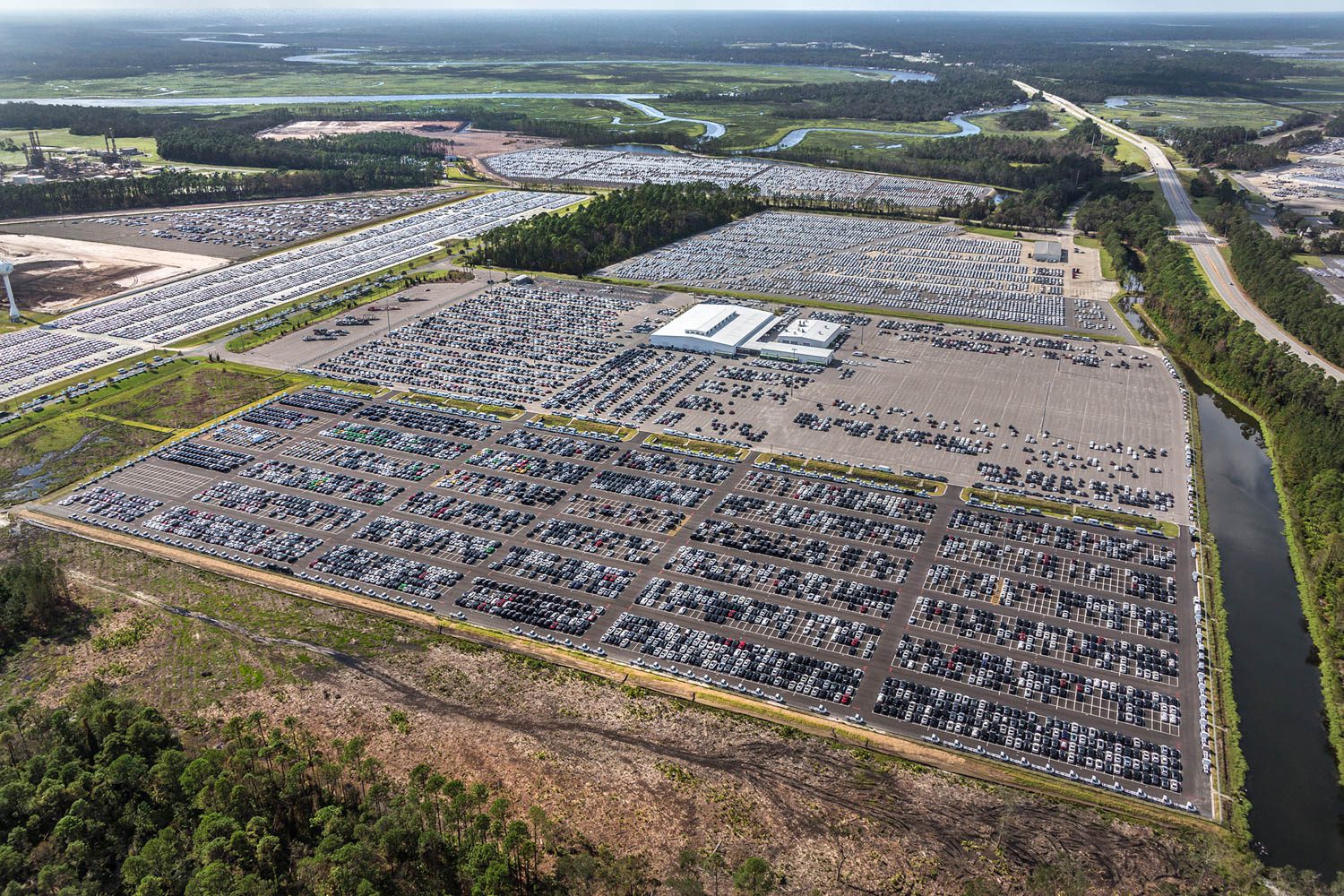The Port of Brunswick moved 614,000 units of Roll-on/Roll-off cargo in Fiscal Year 2019. The Georgia Ports Authority has enough land permitted for expansion to grow capacity to 1.5 million Ro/Ro units per year. (Georgia Ports Authority)
SAVANNAH, Ga., Oct. 2, 2019 – At the Brunswick State of the Port address Wednesday, Georgia Ports Authority Executive Director Griff Lynch thanked the U.S. Coast Guard, Brunswick Bar Pilots and port workers for their efforts in the crew rescue, ongoing vessel salvage and reopening of the Port of Brunswick after the car carrying ship Golden Ray capsized Sept. 8.
“The Coast Guard and our Brunswick maritime community came together in an impressive display of teamwork, focused first on the safety of the crew, and now on protecting the natural environment and the safety of vessel operations,” Lynch said. “In only four days, we were able to reopen the port, protecting the livelihoods of our direct employees and thousands of others across the region. On behalf of the Georgia Ports Authority, I would like to thank all those involved in the rescue and salvage operations.”
Georgia Gov. Brian Kemp said U.S. Coast Guard Cmdr. Norm Witt of the Marine Safety Unit in Savannah and Captain John Reed are to be commended for the Coast Guard’s quick rescue of the ship’s crew and river pilot, and for their continuing work to restore normal operations.
“I applaud the quick action of the Coast Guard, tugs, maritime engineers and emergency responders in the rescue of the ship’s entire crew and the river pilot on the Golden Ray,” Kemp said. “We all felt tremendous relief as the last sailor was brought to safety. Now that the mission has shifted to recovery, we appreciate the Coast Guard’s efforts to accommodate river traffic while salvagers work to right the vessel and clear the channel. The Port of Brunswick is an important asset to Georgia, supporting employment across an array of industries.”
Port activity in Glynn and the five surrounding counties supports nearly 11,000 jobs in business sectors such as forest products, automobile processing, retail and other services according to an economic impact study conducted by the University of Georgia’s Terry College of Business. Statewide, Georgia’s deepwater ports support more than 440,000 full- and part-time jobs, yielding $25 billion in personal income each year.
The growth at Colonel’s Island autoport is thanks in part to its logistical advantage, including immediate access to Interstate 95, and from there, I-10 and I-16.
“Brunswick’s proximity to Southeastern dealerships and auto manufacturers, combined with its ability to reach important inland markets via CSX and Norfolk Southern, makes it an ideal hub for the import-export of vehicles,” said GPA Board Chairman Will McKnight. “Service from nine ocean carriers means Brunswick has the global connections to efficiently move exports and imports.”
During the event hosted by the Brunswick Golden Isles Chamber of Commerce, Lynch also announced the development of a 40-acre dockside parcel dedicated to auto processing at the Roll-on/Roll-off port at Colonel’s Island Terminal. “Construction is complete and the new space is now open for Ro/Ro operations,” Lynch said. “With this expansion, the Port of Brunswick is ready to take on substantial new business.”
The development increases the car storage area by approximately 6,000 spaces, and provides a 9-acre staging area for high and heavy equipment being loaded or unloaded from vessels. The benefits will include additional capacity and speedier vessel processing.
The new dockside expansion will increase GPA’s rail capacity for autos at Brunswick, adding 14,100 feet of track. This, in turn, will allow Brunswick to expand service in markets west of the Mississippi River and into the American Midwest. In FY2019, more than 110,000 vehicles were transported to inland markets from Brunswick by rail.
GPA has also added a second access road between the docks and the island’s south side. This provides a more direct route to existing auto processing lots and new development on the south end of the terminal.
Also at the Brunswick State of the Port, Lynch thanked BMW for signing a new 20-year contract to move vehicles through Colonel’s Island Terminal. The German carmaker has tapped Georgia Ports for vehicle logistics since 1988. In the last 15 years, BMW has moved 612,000 vehicles via Brunswick.
In FY2019, the Port of Brunswick handled a total of nearly 614,000 units of Roll-on/Roll-off cargo, an increase of 4 percent, or 23,000 units. Including the 36,000 units moved via Ocean Terminal in Savannah, Georgia is the second busiest hub for the import-export of vehicles, machinery and other types of Ro/Ro cargo in the U.S.
At East River Terminal in Brunswick, terminal operator Logistec moved 1.2 million tons of bulk cargo in FY2019, an increase of 203,000 tons, or 20 percent. The improvement was largely associated with an increase in wood pellets, peanut pellets and perlite.
Georgia’s deepwater ports and inland barge terminals support more than 439,000 jobs throughout the state annually and contribute $25 billion in income, $106 billion in revenue and $2.9 billion in state and local taxes to Georgia’s economy. The Port of Savannah handled 8.5 percent of U.S. containerized cargo volume and 10 percent of all U.S. containerized exports in FY2017.
For more information, visit gaports.com, or contact GPA Chief Communications Officer Robert Morris at (912) 964-3855.










